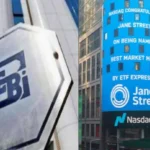Mumbai, India – July 4, 2025 – In a landmark move sending shockwaves through global financial markets, the Securities and Exchange Board of India (SEBI) has issued a drastic interim order banning Jane Street Group, a prominent US-based quantitative proprietary trading firm, from accessing the Indian securities market. Accompanying the ban is an equally significant directive to impound ₹4,843 crore (approximately $570 million), identified by SEBI as the “unlawful gains” derived from alleged manipulative trading practices.
SEBI’s allegations against Jane Street involve a sophisticated, algorithmic strategy that allegedly manipulated India’s benchmark stock indices, specifically the Nifty 50 and an index of 12 major Indian banks, to profit from their significant positions in corresponding index options.
Here’s a breakdown of the alleged manipulation and how it was reportedly carried out:
The Core Allegation: Influencing Index Prices at Expiry
The central accusation is that Jane Street took outsized derivative positions in weekly index options (which expire very frequently, often every Thursday). Then, they allegedly manipulated the underlying cash equities (stocks) that make up these indices to influence the index’s closing price on the expiry day. This would allow their massive options positions to expire “out of the money” (worthless) or “in the money” at a favorable price, netting them huge profits.
How They Allegedly Did It (The “Complex and Illegal Manner”):
Based on reports and SEBI’s ongoing investigation, the alleged strategy involves a combination of:
- Taking Large Positions in Index Options:
- Jane Street, being a high-frequency trading firm, would take very large, concentrated positions in weekly index options, particularly “short” positions (betting the index would not move above or below a certain point).
- These positions were described as being “abnormally high” or “largest risks in cash equivalent terms” especially on expiry days.
- The goal here would be to collect significant premiums from selling these options.
- Manipulating Underlying Stocks at Critical Times (Especially Near Expiry):
- Once they had taken these large option positions, the alleged manipulation would involve trading the individual stocks that comprise the Nifty 50 or the Bank Index.
- “Smoothing Out Volatility” or “Creating Resistance”: Jane Street is accused of actively trading the underlying cash equities in a way that prevents the index from moving beyond a certain price point, particularly as it approaches the option expiry strike price. This could involve:
- Selling heavy-weight stocks: If the index was approaching a level that would make their short options position unprofitable, they might aggressively sell large quantities of the most influential stocks within that index (e.g., HDFC Bank, Reliance, ICICI Bank for the Nifty or Bank Nifty).
- Balancing Buy-Sell Orders: Using their sophisticated algorithms, they could allegedly place a large volume of buy and sell orders at specific price points to create artificial “resistance” or “support” levels, effectively “pinning” the index around a desired price.
- Rapid Reversals and Price Deviations: Some reports mention “rapid reversals” and “transactions at prices significantly deviating from the market.” This suggests tactics where they might quickly buy or sell large blocks of shares, creating a temporary price swing, and then immediately reverse the trade to profit from the induced volatility, or simply to nudge the index in a particular direction.
- Profiting from Options Expiry:
- If their manipulation of the underlying stocks successfully kept the index within their desired range (e.g., below the call option strike or above the put option strike they were short), those options would expire worthless, allowing Jane Street to pocket the entire premium they collected from selling them.
- Alternatively, if they pushed the index to a favorable strike price, their options positions would become profitable.
Why This is Considered Manipulation:
- Artificial Price Influence: The key element of manipulation is that Jane Street allegedly did not profit from genuine market movements, but rather by creating artificial price movements or preventing natural ones, purely to benefit their pre-existing derivative positions.
- “Bait and Switch” (Alleged): Some reports describe a “bait and switch” strategy where large positions are taken in derivatives to attract smaller investors, then manipulative trades are made in the cash market to secure profits. This distorts the market’s price discovery mechanism and can disadvantage smaller, less sophisticated investors.
- Disregard for Warnings: SEBI explicitly stated that Jane Street continued these trading patterns even after the National Stock Exchange (NSE) issued a caution letter in February 2025, warning them that their trading patterns were “prima facie fraudulent and manipulative.” This indicates a continued, deliberate engagement in the alleged activity despite regulatory alerts.
- Excessive Profits: The sheer scale of Jane Street’s profits from Indian equity derivatives (over $2.3 billion in 2024, reportedly five times more than the second-largest firm) raised red flags and contributed to the investigation. This unusual profitability, combined with the observed trading patterns, suggested something beyond legitimate market making or trading.
Example Scenario (Hypothetical, based on reports):
Imagine Nifty 50 is at 22,000. Jane Street believes it won’t go above 22,000 by Thursday’s expiry. They sell a massive amount of Nifty 50 Call Options with a strike price of 22,000. If Nifty closes at or below 22,000 on expiry, these options expire worthless, and Jane Street keeps the premium.
As Thursday approaches, let’s say Nifty starts creeping up towards 22,000 (e.g., to 21,990). To ensure it doesn’t cross 22,000, Jane Street’s algorithms might:
- Massively sell shares of Reliance, HDFC Bank, and ICICI Bank (heavyweights in Nifty 50) in the cash market in the final minutes of trading.
- Place large, strategically timed sell orders near 22,000 to create an artificial “ceiling.”
- If successful, Nifty might close at, say, 21,995. The 22,000 call options expire worthless, and Jane Street makes a huge profit from all the premiums collected.
This “complex and illegal manner” is what SEBI is clamping down on, highlighting the challenges regulators face in monitoring highly sophisticated, algorithmic trading strategies that can subtly (or not so subtly) influence market prices for private gain.
Keep following Duniya Daily for more such important news and updates!










